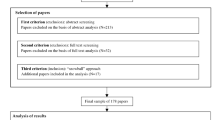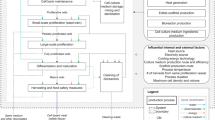Abstract
Public concern over environmentalquality and food safety has culminated in thedevelopment of markets for “green” foods – foodsthat are variously construed as fresh, chemical-free,nutritious, natural, or produced in anenvironmentally-sustainable manner. Understanding theemergence of “green” foods is dependent on analysisboth of the ways in which foods are produced andprocessed, and of the meanings that are attached tothem at each stage of their production,transformation, and consumption. The notion of “green”foods is thereby understood here as a fluid andcontestable signifier that myriad actors involved inthe production/consumption cycle may attempt to shapefor their own purposes. This paper explores corporate capital's recent attempts, through certification logosand advertising, to signify the “healthiness” andenvironmental virtues of organically-produced foods inAustralia and New Zealand. These attempts have not,however, been universally successful either in termsof gaining consumer interest, or in gaining agreementsbetween farmers, certifying organizations, andcapitalist firms over the meaning of “organic” and thepractice of “sustainable” agriculture. The experienceof corporate involvement in the organics industry isillustrative of yet-to-be-resolved processes ofreflexive modernization. As food production andtransformation continues to produce environmental andsocial risks, the question of just what makes food“green” will continue to be a source of social conflict.
Similar content being viewed by others
References
Abercrombie, N. (1994). “Authority and consumer society,” in R. Keat, N. Whiteley, and N. Abercrombie (eds.), The Authority of the Consumer (pp. 43–57). London: Routledge.
Anonymous (1993). “Uncle Tobys give facts on nutrition.” Retail World 48(8): 12.
Anonymous (1995). “Relaunch for oats.” Retail World 48(8): 24.
Anonymous (1996). “Watties Frozen Foods-Certified organic frozen vegetables.” Food Australia 48(8): 352–353.
Beck, U. (1992). Risk Society: Towards a New Modernity. London: Sage.
Beck, U. (1996). “Risk Society and the Provident State,” in S. Lash, B. Szerszynski, and B. Wynne (eds.), Risk, Environment and Modernity: Towards a New Ecology (pp. 27–43). London: Sage.
Buttel, F. (1993). “Environmentalization and greening: Origins, processes and implications,” in S. Harper (ed.), The Greening of Rural Policy: International Perspectives (pp. 12–26). London: Belhaven.
Campbell, H., J. Fairweather, and D. Steven (1997). Recent Developments in Organic Food Production in New Zealand: Part 2, Kiwifruit in the Bay of Plenty. Dunedin: University of Otago.
Clarke, R. (1991). “Organic foods: For better or worse.” Food Australia 43(1): 12–14.
Cook, I. (1994). “New fruits and vanity: Symbolic production in the global food economy,” in A. Bonanno, L. Busch, W. Friedland, L. Gouveia, and E. Mingione (eds.), From Columbus to ConAgra: The Globalization of Agriculture and Food (pp. 232–248), Lawrence: University Press of Kansas.
Dumaresq, D. and R. Greene(1997). “Overview of the organic industry in Australia,” in D. Dumaresq, R. Greene, and L. van Kerkhoff (eds.), Organic Agriculture in Australia (pp. 95–109), Canberra: Rural Industries Research and Development Corporation Research Paper No 97/14.
Fischler, C. (1988). “Food, self and identity.” Social Science Information 27(2): 275–292.
Giddens, A. (1991). Modernity and Self-Identity. Cambridge: Polity.
Goodman F. (1996). Goodman Fielder Annual Report. Sydney: Goodman Fielder Limited.
Gray, T. (1997). “Politics and the environment in the UK and beyond,” in M. Redclift and G.Woodgate (eds.), The International Handbook of Environmental Sociology (pp. 287–299), Cheltenham, UK: Edward Elgar.
Hannigan, J. (1995). Environmental Sociology: A Social Constructionist Perspective. London: Routledge.
Harst-Collaris, van der T. and L. Scandurra (1997). “Dutch organic food market offers all-natural potential for U.S. firms.” AgExporter August: 10–15.
Hoban, T. (1989). “Anticipating public response to biotechnology.” The Rural Sociologist 9(3): 20–24.
Inglehart, R. (1981). “Postmaterialism in an environment of insecurity.” American Political Science Review 75: 880–900.
Lash, S. and J. Urry (1994). Economies of Signs and Space. London: Sage.
Lawrence, G. (1996). “Rural Australia: Insights and issues from contemporary political economy,” in G. Lawrence, K. Lyons, and S. Momtaz (eds.), Social Change in Rural Australia (pp. 332–349), Rockhampton, QLD: Rural Social and Economic Research Centre.
Lockie, S. (1997). “Beyond a ‘good thing’: Political interests and the meaning of Landcare,” in S. Lockie and F. Vanclay (eds.), Critical Landcare (pp. 29–43). Wagga Wagga, NSW: Centre for Rural Social Research Key Papers No. 5, Charles Sturt University-Riverina.
Lockie, S. (1998). “Environmental and social risks, and the construction of ‘best-practice’ in Australian agriculture.” Agriculture and Human Values 15(3): 243–252.
Lupton, D. (1996). Food, the Body and the Self. London: Sage.
Lyon, N. (1994). “Organic farming to attract new markets.” Australian Farm Journal 4(10): 62–63
Lyons, K. (1997). “What shade the greenwash? Corporate environmental commitment to organic agriculture or constructing a green facade,” Presented to Environmental Justice: Global Ethics for the Twenty First Century, 1–3 October, Victoria: Melbourne University.
Lyons, K. (1999). “Corporate environmentalism and the development of Australian organic agriculture.” Rural Sociology.
Michelsen, J. (1996). “Organic farmers and conventional distribution systems: The recent expansion of the organic food market in Denmark.” American Journal of Alternative Agriculture 11(1): 18–24.
Miller, D. (1995). “Consumption as the vanguard of history: A polemic by way of an introduction,” in D. Miller (ed.), Acknowledging Consumption: A Review of New Studies(pp. 1–57), London: Routledge.
Miller, P. and N. Rose (1997). “Mobilizing the consumer: Assembling the subject of consumption.” Theory, Culture and Society 14(1): 1–36.
Mitsuda, H. (1997). “Surging environmentalism in Japan: A sociological perspective,” in M. Redclift and G. Woodgate (eds.), The International Handbook of Environmental Sociology (pp. 442–452), Cheltenham, UK: Edward Elgar.
Munro, R. (1996). “The consumption view of self: Extension, exchange and identity,” in S. Edgell, K. Hetherington, and A. Warde (eds.), Consumption Matters: The Production and Experience of Consumption (pp. 248–273), Oxford: Blackwell.
Rural Industries Research and Development Corporation (1997). Organic Agriculture in Australia. Canberra, Rural Industries Research and Development Corporation.
Saunders, C., J. Manhire, H. Campbell, and J. Fairweather (1997). Organic Farming in New Zealand: An Evaluation of the Current and Future Prospects Including an Assessment of Research Needs. Canterbury: Lincoln University.
Schilling, E. (1995). “Organic agriculture grows up.” California Journal May: 23–25.
Author information
Authors and Affiliations
Rights and permissions
About this article
Cite this article
Lockie, S., Lyons, K. & Lawrence, G. Constructing “green” foods: Corporate capital, risk, and organic farming in Australia and New Zealand. Agriculture and Human Values 17, 315–322 (2000). https://doi.org/10.1023/A:1026547102757
Issue Date:
DOI: https://doi.org/10.1023/A:1026547102757




